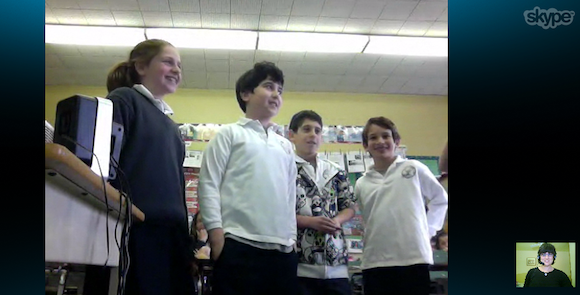In my first Voices post, I reflected on my work with students around the world as an online teacher for JETS, our Israeli-based company. The technology is powerful, I said, but what fascinates me most about distance learning is the human reaction to these technology-supported events. I think there is a need, in today’s wired world, to connect to another person far away, living a different, yet somehow similar life.
Another major a-ha for me as an online teacher is the dynamic and potential for group involvement. When I describe what I do to people who are, shall we say, “not connected to the world of web culture,” they are amazed. “You mean the kids can see you and hear you? Don’t they get bored?”
Well, if all they did was listen to me teach, then yes, they would get bored. Wouldn’t you? Which is why I make sure that my classes do not involve lecturing. Obviously, there is discussion. But there is also much more. In fact, I am actually amazed at how much interaction there can be, not only intellectually but physically.
For example, I assigned students in Vancouver, Canada a project to research a site in Israel, share a photo, and state what occurred there 2000 years ago, and what is done there today. After each group of students presented, I gave them 60 seconds to organize themselves, representing their sites, in the correct geographical order; lining up accordingly, without any teacher assistance. A mass huddle and group discussion ensued. “Where is Metulla? Is it higher than the Golan Heights? Is Eilat beneath Be’er Sheva?’
The map of Israel hanging in the corner of their physical classroom, usually neglected, was frequently consulted. In 60 seconds, more or less, a group of very excited fourth graders queued up in front of the camera and happily shouted out the name of their city or town, in order. When I began teaching this group, there was little to no knowledge about Israel’s geography and history. After a few short weeks, how much had they learned — in engaging, stimulating ways!
Online, every voice is heard
For older classes, technology often replaces physical movement (but not entirely! More on that another time). For example, online tools are often used as a key method of communication. Wikis replace whiteboards (and line-ups). The creation of online artifacts and student presentations encourages group work, and ensures that I hear from every student in the class. In a classroom discussion, typically, a few students dominate. In an online discussion, every voice is heard, from shy students and learning disabled ones, even ones with special needs, who might not ordinarily speak out.
There was one incident in a Los Angeles high school of a student who was pulled out of my class after a week. The school administrator explained that she was placed there by mistake. The student was autistic and the administration felt the dynamics of an online class would be too much for her. The course was blended: M, T, W were live video conferencing sessions and Thursday, they completed coursework online.
After a few days, the autistic student was back.
“What’s going on?” I asked the principal.
“Do you mind if she stays?” he asked. “She was placed in a regular class and she said it wasn’t nearly as interesting and stimulating as yours.”
I laughed. She stayed, and she taught us so much. She created beautiful, intelligent movies, PPTs, games, and songs. Her opinion shone through, and I often used her work as an example of excellence. Another shy student who sat in the back and hated to be called on had the most fabulous posts. But ask her to say the same things in class? Never. Online tools provide a level of comfort for students who do not want to be in the limelight. I realize that some of these strategies and web-based tools can be utilized in a traditional classroom setting. They are all the more appropriate for an online setting.
A final lesson learned: Creativity, planning, organization and follow-up are all skills I’ve had to hone in my role as an online teacher. I used these skills when I taught students face to face as well, but I’ve found that ‘winging a lesson’ was much more possible when we were all in the same physical room. I just can’t get away with that in my virtual world.
Travel has never been so easy
 Personally, I love connecting. I find my job extremely rewarding, from listening to the opinions of students from all walks of life, to engaging students across many grades (4th-12th in fact) physically, intellectually and virtually. I enjoy my insta-travel with my large screen in my home office. Travel has never been so easy! I click my mouse, and boom: Jacksonville, Edmonton, Houston. I’ve asked educators who don’t interact with other students or locations why they choose not to. Sometimes they say ‘I don’t have time,’ or ‘it’s too much of a bother’ to connect to students or programs elsewhere. Perhaps more guidance can become available from tech staff and from teachers who have connected to other students online and who share their experiences.
Personally, I love connecting. I find my job extremely rewarding, from listening to the opinions of students from all walks of life, to engaging students across many grades (4th-12th in fact) physically, intellectually and virtually. I enjoy my insta-travel with my large screen in my home office. Travel has never been so easy! I click my mouse, and boom: Jacksonville, Edmonton, Houston. I’ve asked educators who don’t interact with other students or locations why they choose not to. Sometimes they say ‘I don’t have time,’ or ‘it’s too much of a bother’ to connect to students or programs elsewhere. Perhaps more guidance can become available from tech staff and from teachers who have connected to other students online and who share their experiences.
[Can you imagine telling someone who has the means to travel ‘not to bother?’ ]
One aspect of the 21st century skill set involves developing global citizenship skills. Online learning offers a number of methods to develop these skills for our ever changing and connected world.
Online learning seems to me like a bike ride. The destination is the world. Each city is another spoke of the wheel. And the rider? Well, that’s up to you.
One’s destination is never a place, but a new way of seeing things. — Henry Miller
Smadar Goldstein
Latest posts by Smadar Goldstein (see all)
- Why I Would Never Go Back to Offline Teaching - June 19, 2014
- Cheating vs Collaborating in Online Learning Environments - May 30, 2014
- What is Your Ideal School? - October 31, 2013




I really liked your article. I think it’s an important description of how the pedagogy has to change if we are to utilize online teaching.
I’m interested in understanding how you have develop this new kind of instrucitonal strategies….like creating the interactivity by re-arranging pictures.
Can you tell us more?
Hi Marsha,
Thank you for your interest. I’ve developed pedagogical techniques through observing my students and constant self reflection, which consist of asking myself questions like ‘would I want to be in this class?’ If kids are bored, not learning or unstimulated when you are present as the online teacher, I would say your job will be over pretty quickly. So I try to keep things interesting. I have lots of pedagogies to keep them guessing: skits, debates, sketching, charades, etc. Happy to have a more extensive conversation!
smadar@jetsisrael.com
skype: semadargoldstein